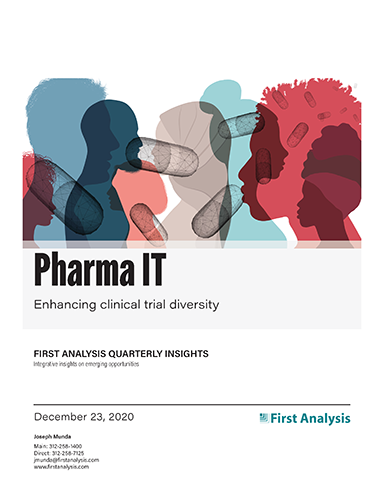Quarterly insights: Pharma IT
Enhancing clinical trial diversity

Representing population diversity in trials is important given a review of 167 new molecular entities approved by the FDA between 2008-2013 showed approximately 20% had racial or ethnic differences in safety, efficacy and response. However, trial diversity remains a challenge for drug sponsors.
New guidance from the FDA and others regarding how to broaden eligibility criteria to increase clinical trial enrollment of underrepresented populations provides a roadmap to addressing this challenge. eClinical technology vendors – companies that combine technology, applications, and services to automate clinical trial data collection, management and analysis and to automate other aspects of clinical trials – are providing the tools to make it happen.
We highlight a handful of innovative companies whose software and other technology promote diversity and accessibility in clinical trial enrollment and participation.
Digital biomarkers, developed using digital technologies that make it possible to efficiently collect and manage large volumes of high-quality patient data across dispersed geographies and expansive timelines, are particularly important in achieving diversity and represent an area seeing substantial development, transactions and investment.
TABLE OF CONTENTS
Includes discussion of Dassault/Medidata (Paris: DSY) and ten private companies
- New guidance addresses critical challenge of trial diversity enrollment
- Technology vendors provide tools for the task
- Digital biomarkers promote inclusion and enhance study quality
- Better value for all
- Commercialization and eClinical indices continue recovery
- Pharma IT M&A rebounds in Q4
- Q4 pharma IT private placements continue trend downward
New guidance addresses critical challenge of trial diversity enrollment
COVID-19 has made patient engagement a top priority for the life sciences industry, especially when it comes to recruiting, enrolling and retaining trial participants. Even prior to COVID-19, recruiting and enrolling patients into clinical trials required considerable time and expense. Industry estimates suggest 50% of clinical trials need to extend their recruitment period, resulting in a loss of up to $1.3 million per day for a given drug candidate. 11% of trial sites fail to recruit any patients while 18% of trial participants drop out after enrolling.
Additionally, trial diversity remains a challenge for sponsors despite many trial sites providing medical care for patients of various ethnicities and socioeconomic backgrounds. For example, Black people are about 5% of all patients enrolled in U.S. Food and Drug Administration (FDA) registered clinical trials but represent about 13% of the U.S. population. Adequate representation of population diversity in trials is important given a review of 167 new molecular entities approved by the FDA between 2008-2013 showed approximately 20% had racial or ethnic differences in safety, efficacy and response. Trial diversity becomes particularly important when it comes to COVID-19, which affects patients disproportionately relative to ethnicity, age and economic background.

Request full report
To access the full report, please provide your contact information in the form below. Thank you for your interest in First Analysis research.
